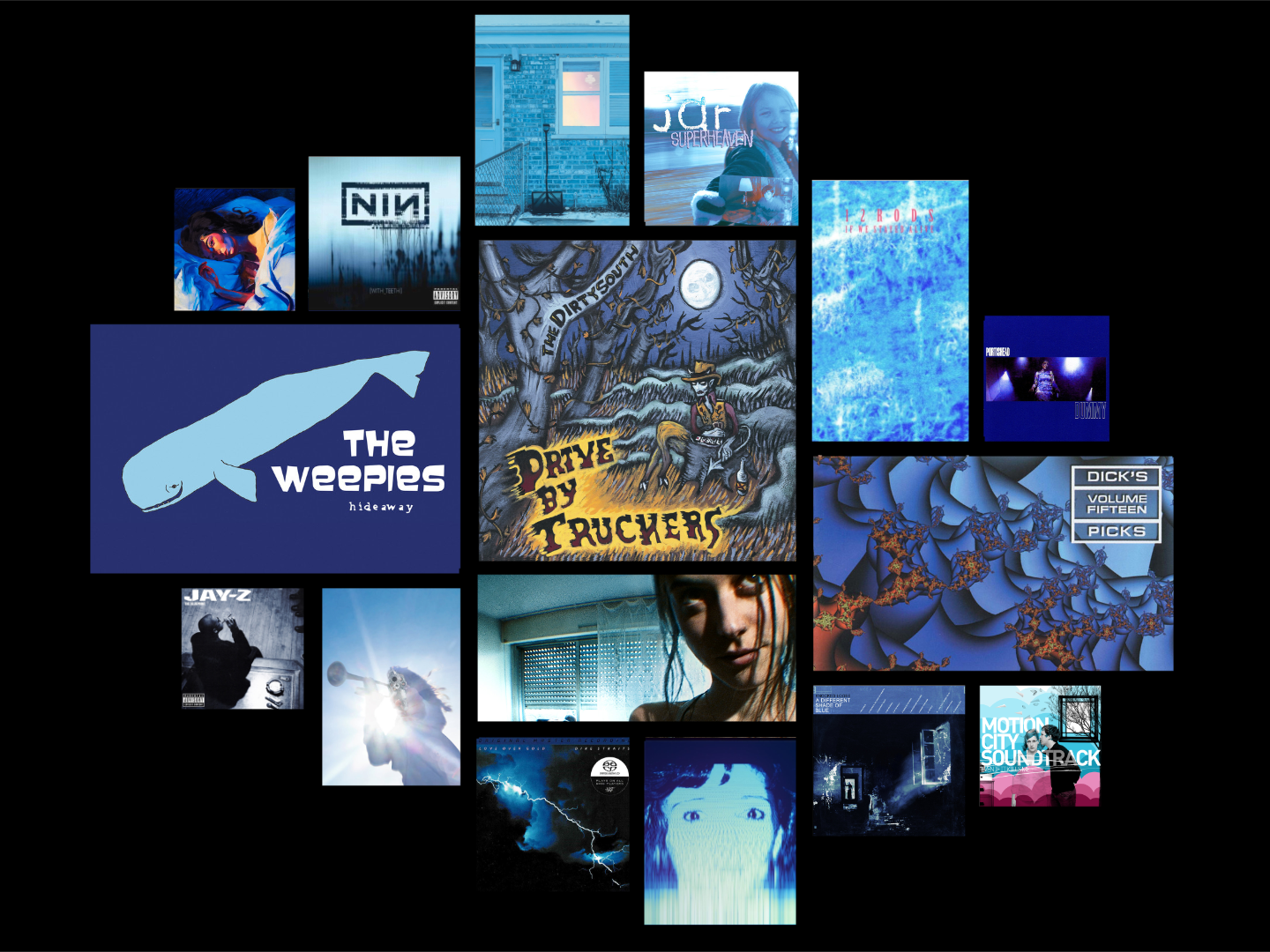Aaron West and The Roaring Twenties – In Lieu of Flowers | Album Review
/Hopeless Records
Buffalo Bills faithful Aaron West can’t seem to catch a break these days—or ever. On In Lieu of Flowers, the third full-length album of Dan Campbell’s solo project, we find West most chained to his vices.
Anyone familiar with Campbell’s songwriting in The Wonder Years knows the man is sick with nostalgia. It pierces through his writing like no other, yet he continuously finds ways to keep it rewarding and refreshing. When TWY released The Greatest Generation in 2013, the pop-punk cognoscenti declared the band’s three-album run triumphant. The Philadelphian six-piece had successfully crafted a trilogy on growing up and, in the process, had created something larger than themselves that millions of fans connected with, even a decade later. Even with this achievement, the band continued to write and release albums, although they had largely laid their signature pop-punk sound to rest.
A year after TWY cemented themselves as pop-punk royalty, Aaron West was born. Campbell’s construction of “Aaron West” speaks to the ever-growing nature and evolution of his songwriting. He carefully crafted West as a snake-bitten alcoholic musician from New Jersey who struggles in the way most of us do. His music career is faltering, his relationship is crumbling, and his loved ones are dying. At heart, Campbell is a storyteller who’s found his niche in songwriting, and as we come upon the end of yet another trilogy in his musical universe, there’s no question as to why everything he touches turns to gold.
Before diving into In Lieu of Flowers, I would be remiss not to start at the project’s debut album since the Aaron West albums all tell a very intentional chronological story. As a brief recap of We Don’t Have Each Other, the inception of Aaron West details the worst year of his life in which his father passes, his wife suffers a miscarriage, and his wife leaves him. This is all capped off with his contemplation of drowning himself in the ocean, chased by a Mountain Goats cover that acts as a palette cleanser. Now, another EP, single, and album’s worth of lore has conspired in the 10 years since that first dispatch, however, the most important aspect to know going into ILOF is that, despite slapping band-aids on old wounds, we find that West never took the time to properly heal from the events of that fateful year depicted on his first album.
ILOF kicks off with our nomadic protagonist claiming, “It feels like shit to be alone again.” Track one of the LP, “Smoking Rooms,” starts somber and explodes into an existential apex torn between the less-than-glamorous life of a solo musician and being someone his family can count on.
This, more than anything, seems to be the all-encapsulating theme of the album. On the project’s sophomore release, Routine Maintenance, we listen as the project grows from just Aaron West to Aaron West and the Roaring Twenties. He comes to find family and meaning in what began merely as a solo project to sing his woes. Additionally, he finds meaning in life with his nephew Colin that he couldn’t find anywhere else. With both of their dad’s abrupt passings, West took it upon himself to be the father figure that both were suddenly lacking. Fast forward five years and West’s neglect of his mental health has begun to chip away at everything he once found joy in.
The third installment of Aaron West’s story leans into his folk-tinged americana sound more than ever. Track three, “Paying Bills at the End of the World,” most notably pays homage to this sound with West singing the blues set to the melancholic wanes of the lap steel. The lyrics update the listener on the lull in West’s life during the global pandemic of 2020. He sings the sorrows of every malcontent US citizen that year: dreaming of catching COVID and simply dying because we can't afford health insurance.
In spite of all the gloom in his world, Campbell still injects humor and irony into his writing. In the same song, we hear West whimper, “Of doves and palms and cartoon Jesus dying on the cross I say he must be running late.” Poking fun at his broken relationship with religion, the band’s music video for this song ironically takes place in a church.
While this project is a concept at its core, it takes place in the world as we know it. West, like the rest of us, put our lives on pause while COVID ran rampant through the world. Campbell uses this to further push the authenticity of the project. He weaves truths throughout West’s story, as seen on track 5, “Alone at St. Luke’s.” During an IRL 2022 tour, the Twenties all caught COVID, with Campbell being the only one to duck the sickness. The band was forced to fly home and Campbell stayed in Glasgow to finish the tour solo. It’s also in this track where we get a call back to LP1 highlight “Get Me Out of Here Alive,” in which West now claims that “The stained-glass light just punched me in the chest.”
Additionally, Campbell did his due diligence in crafting the character of Aaron West. He describes the character as “a little bit of everyone I’ve ever met”. What makes Aaron West’s story so special is this genuineness. Campbell entwines truths and lived experiences into his fictional character, which contributes to its legitimacy. While there are parts of the story that Campbell admits to having happened in real life, we’ll truly never know what parts are and are not fictitious. Despite this, the listener doesn’t doubt that any of the events in West’s trilogy are fabricated because they deal with very real and dwelled human troubles.
Photo by Mitchell Wojick
My favorite aspect of this album is how it contains the first-ever love song we get from Aaron West. After rekindling with an old flame from high school early on the album, we find the first occurrence of West showing even the slightest amount of interest in someone romantically who is not Diane, his ex-wife. A new character in the Aaron West story is introduced on track 4, “Monongahela Park.” Sam, whom West hadn’t seen in years, knows nothing of the West that we’ve come to know and love. Even with this opportunity to start fresh, West’s calloused heart can’t bring himself to let her in.
Believe it or not, ILOF is also the most emo we find Aaron West. He’s in a begrudgingly sour fight with himself and what he wants in life. Between the band, his broken love life, his lack of belief in a higher power, and his surging alcoholism, West is tearing at the seams. Tracks 6 and 7 are where we get the lowest of West. Hanging onto every last bit of popularity from the Twenties’ fizzling fame, West is burning every last bridge in an alcohol-fueled frenzy as he exclaims, “I’ll see you in the water.”
Regardless of how much West wants to give up and succumb to his addiction, the people in his life won’t let him. After checking himself into rehab on track 9, “Runnin’ Out of Excuses,” West finds his next move. The track starts slow over piano, with West watching the Bills choke away yet another promising year. It moves into an upbeat and nostalgia-lined recap of his time in rehab. West acknowledging his fuck ups bring us that much closer to the album's penultimate track, “In Lieu of Flowers.”
The track was released as the first single with the announcement of the album, likely because it’s the most conquering track on the record, however, we now know that this song ties up all the loose ends of the album. Listening to this track before and after knowing the events of the album reframes the song's meaning. Kicking off the track with a catchy horn melody contributed by producer Ace Enders, the song hooks listeners instantly. It’s in this track where West is mending the bridges that he burnt throughout the album. Even though Sam, his nephew Colin, his sister Catherine and the Twenties “could’ve told him to fuck himself,” they encourage him to brush the dirt off the grave that he dug for himself.
Photo by Mitchell Wojick
There are a million story beats and easter eggs that can be found throughout the Aaron West discography, and that’s what makes it so enjoyable to dig into. At this point in his story, every track is a must-listen, not just for the musical brilliance, but to catch every detail that caps off what could be the end of the Aaron West story. The bookend tale divulges the struggles of family, love, and religion. Much like those Bills teams of the 2000s, West was struggling to get his shit together long enough to reap the harvest. He found support and solace in those he thought would leave him for dead.
What makes The Wonder Years everyone’s favorite pop-punk band is that they’re entirely relatable. Campbell finds ways to craft songs that are universal no matter the subject matter. The madman has managed to lap this feat and do it all over again with Aaron West. While little is known about the future of West, the listener, without a doubt, is rooting for him. He may be a fictional character, but West is as real as you and I: flawed to all hell, but is trying his best.
Brandon Cortez is a writer/musician residing in El Paso, Texas, with his girlfriend and two cats. When not playing in shitty local emo bands, you can find him grinding Elden Ring on his second cup of cold brew. Find him on Twitter @numetalrev.












